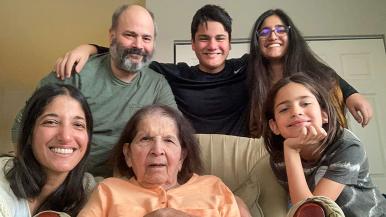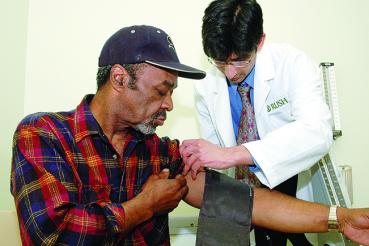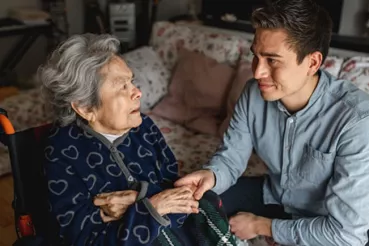More than one in five adults in America cares for a family member, friend or neighbor with a health care need or functional disability, and the majority of whom (61 percent) do so while working.
Among them is Gina Lowell, MD, a general pediatrician at RUSH University Medical Center and director of community health for the Department of Pediatrics. Dr. Lowell works with families every day, supporting parents in their relationships with their children. Despite her expertise in family relationships, Dr. Lowell found her own experience caring for her 88-year-old mother challenging. She also didn’t always view herself as a caregiver.
“You maybe have never really thought of yourself as the caregiver when you have been parented by that person and you have only seen the relationship in that direction,” she said. “There’s a feeling that there's something not entirely right about being a decision-maker for your parent, and I think that was at the heart of what was most troubling to me.”
Dr. Lowell also cares for her three children, and while there are similarities, she notes that caring for a parent is unique.
“Although the overall concepts of caretaking are the same, your perspective can be so different when you're looking in the direction of your parent as opposed to your child,” Dr. Lowell explained.
A systematic, person-centered approach
Seeking help navigating her shifting relationship with her mother, Dr. Lowell reached out to Ellen L. Carbonell, LCSW, assistant professor in the Department of Social Work and consultant for caregiver programs at RUSH University Medical Center. Carbonell connected Dr. Lowell to the Caring for Caregivers program at RUSH.
Developed at RUSH with funding from the RRF Foundation for Aging, the Caring for Caregivers program supports family or friends providing care for adults aged 60 and older. Recognizing the challenges and stressors that caregivers often face, the program offers support, including physical and emotional health assessments, to ensure caregivers are ready, willing and able to perform caregiving tasks.
The program also includes sessions with a licensed clinical social worker to develop a care plan that meets the needs of the care recipient, while protecting and enhancing caregivers’ health and well-being.
“The program’s systematic approach provides structure to the work and enhances it,” said Diane Mariani, LCSW, program manager in Social Work and Community Health. “The program offers individualized, person-centered care because — while there's some commonality among caregivers — we recognize that each situation is unique.”
Thanks to a three-year, $1.9 million grant from The John A. Hartford Foundation awarded to the RUSH Center for Excellence in Aging, other hospitals will also be able to adopt the Caring for Caregivers model. The grant was awarded after RUSH pilot tested the model at six sites, in partnership with the Institute for Healthcare Improvement, with previous funding from the Foundation.
Preliminary data from RUSH shows statistically and clinically significant reductions in symptoms of depression, anxiety and burden for caregivers who have engaged in the intervention. Furthermore, those being cared for are benefiting too, with preliminary findings showing fewer visits to the emergency department, fewer hospitalizations and shorter lengths of stay.
RUSH anticipates similar positive outcomes at other Age-Friendly Health Systems that will be adapting the Caring for Caregivers model.
Navigating the challenges of caretaking
Dr. Lowell notes that many responsibilities come with caring for a parent — from preparing meals to keeping track of medications to scheduling doctor’s appointments. She adds that these responsibilities can be more challenging than they might initially sound.
“Although you’re just preparing a meal for one more person, my mother doesn’t always eat on our schedule, so I need to make sure there is always food available for her when she’s up and ready and that it's something she can easily get to and feel comfortable preparing,” Dr. Lowell explained.
“I could not have handled all the ups and downs that come with life with the grace that I’ve been able to were it not for this program and my coaching sessions with Ellen,” Dr. Lowell said. “She gave me the language I needed to talk with my mom and contextualize the emotions we were experiencing. I could listen to her better. I could hear her better.”
Dr. Lowell’s favorite thing about her job as a pediatrician is helping families thrive, and now she has found a way to apply the skills she uses in the clinic every day to her own family relationships.
“For me to be able to take some of these concepts and flip them around and use them with my own parent has been really helpful,” Dr. Lowell said. “I can weather this much better now. I can navigate this experience much better, and that makes all the difference.”
To learn more about the Caring for Caregivers program, please contact Diane Mariani, LCSW, program manager, Social Work and Community Health, or email caregivers@rush.edu.




